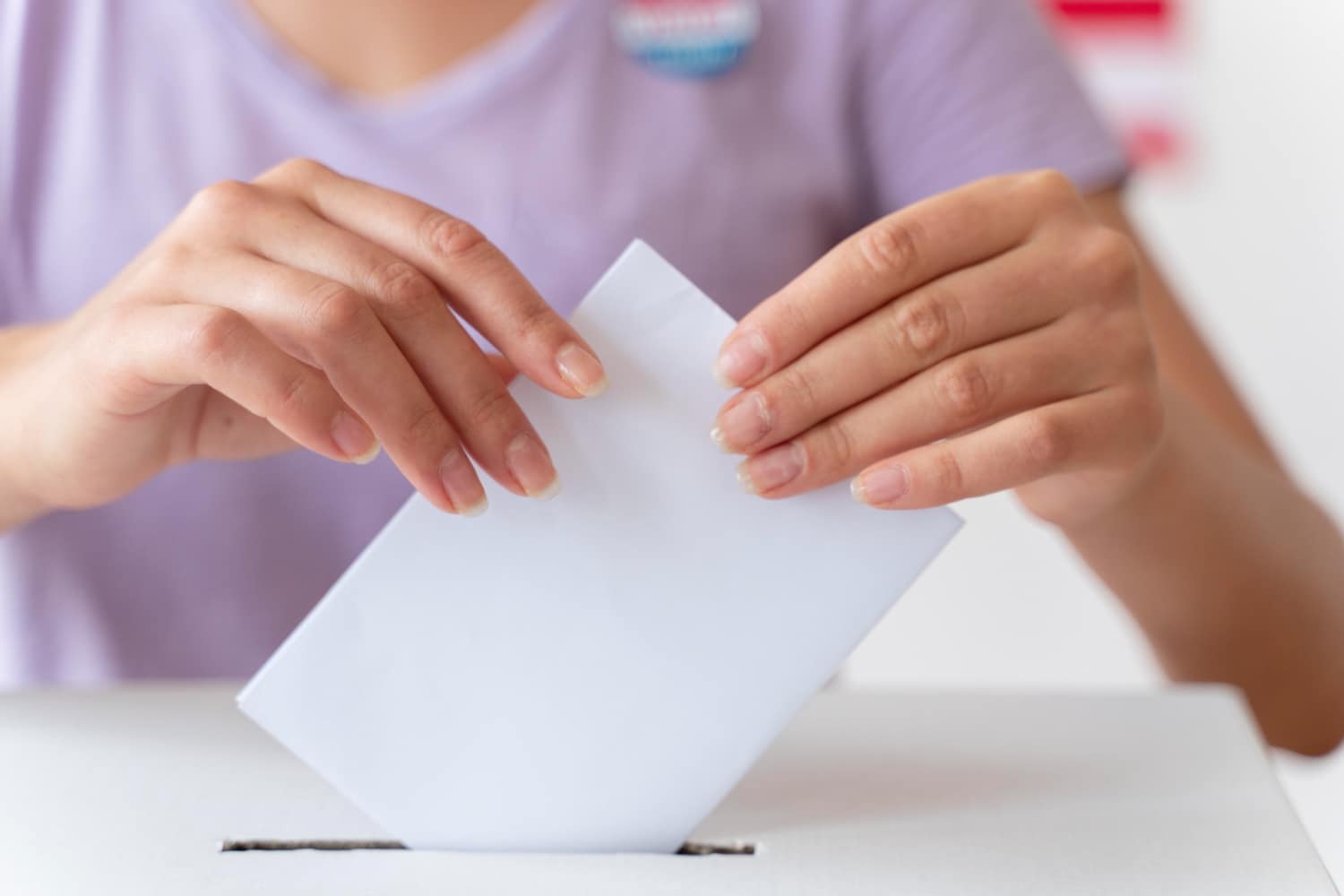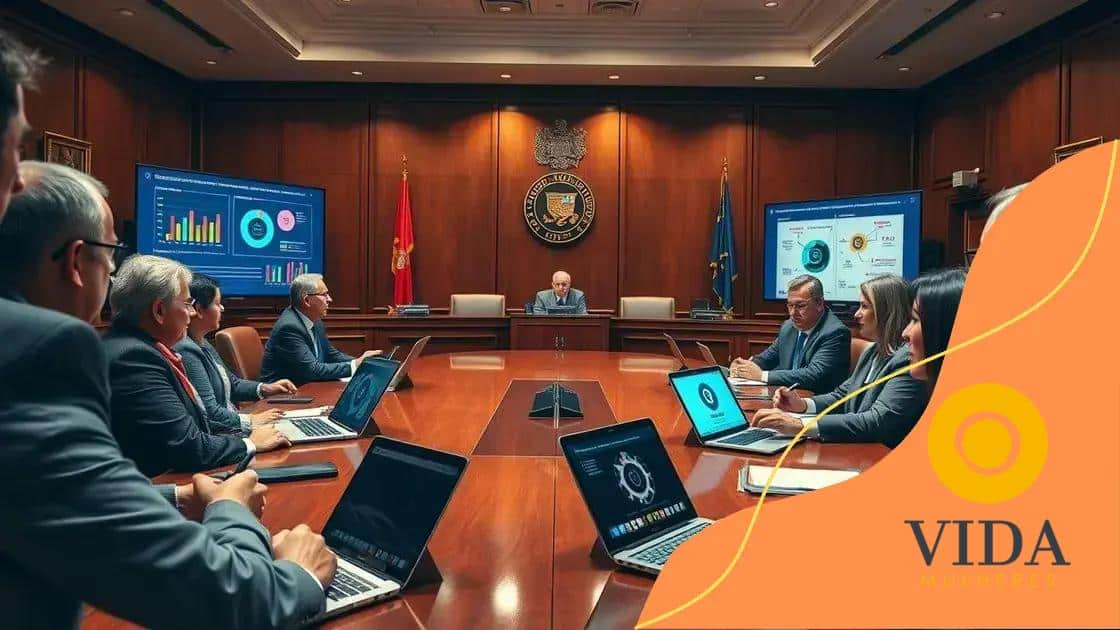Decentralized voting systems tested in municipal elections

Decentralized voting systems enhance election integrity by utilizing blockchain technology for security, boosting public trust, and increasing voter accessibility through technological innovations.
Decentralized voting systems are being tested in municipal elections, promising to enhance transparency and security. Have you ever wondered how these innovations could reshape voting?
Understanding decentralized voting systems
Understanding decentralized voting systems is essential as technology evolves in the electoral process.
These systems aim to improve transparency and security in voting, making them more accessible and trustworthy for everyone.
What are decentralized voting systems?
A decentralized voting system shifts the control of voting from a central authority to the voters themselves. This can be achieved through blockchain technology or peer-to-peer networks.
Unlike traditional voting, where a single entity manages the process, decentralized systems spread the responsibilities among many participants.
Benefits of decentralized voting
- Transparency: Voters can track their votes on the blockchain, ensuring every vote is accounted for.
- Security: Decentralization reduces the risk of tampering or fraud since no single entity controls the entire system.
- Accessibility: With online voting options, more people can participate, including those who may find it difficult to vote in person.
One important aspect of decentralized voting systems is their ability to provide real-time updates. Voters can see live results as they come in, which can enhance their engagement and trust in the electoral process.
Furthermore, voters can use their devices to cast votes securely from anywhere, which is particularly beneficial in our fast-paced digital world.
Despite the advantages, implementing decentralized voting systems does come with challenges.
Technical barriers must be addressed to ensure that all voters can access the technology needed to participate. Additionally, education plays a crucial role in helping people understand how these systems work, thus ensuring wider acceptance and usage.
As interest in decentralized voting systems grows, it’s crucial to examine real-world implementations.
Cities around the globe are piloting these systems, testing how well they perform in real electoral situations. Such experiments can provide valuable insights into the future of democracy in a digital age.
How municipal elections are implementing these systems
Municipal elections are increasingly adopting decentralized voting systems to enhance their processes. These implementations showcase how technology can transform civic engagement and improve election integrity.
Examples of Implementation
Several cities across the globe are leading the way in this innovation. For instance, some municipalities are using blockchain technology to allow voters to cast their ballots electronically.
This method not only speeds up the voting process but also increases transparency, allowing voters to track their votes.
How It Works
- Voter Registration: Using online platforms, voters can register and verify their identities before election day.
- Ballot Casting: Voters receive secure access to the voting system through their devices, where they can select their preferences.
- Real-time Updates: Results can be reflected live, ensuring continued engagement throughout the process.
The incorporation of these systems does not just streamline voting; it also addresses some of the common issues faced during traditional elections.
Problems like long lines and mismanaged ballots can be significantly reduced when decentralized methods are employed.
Many municipal leaders are also prioritizing education about these new systems. As voters become familiar with decentralized voting, the confidence in this technology grows.
Learning sessions and community outreach programs help to clarify how the technology works and reinforce its benefits.
Along with educational initiatives, municipalities are focusing on security measures. Ensuring that decentralized voting systems are robust against potential cyber threats is crucial.
Regular audits and updates are part of maintaining the integrity of the electoral process in these new systems.
Benefits of decentralized voting in elections
The benefits of decentralized voting in elections are increasingly evident as municipalities explore this innovative approach.
By leveraging technology, decentralized systems can improve the electoral process in meaningful ways.
Increased Security
Security is a major concern for any electoral process. Decentralized voting systems use cryptography and blockchain technology to secure votes.
This reduces the risk of tampering and fraud, as each vote is recorded in a tamper-proof ledger.
Enhanced Transparency
- Trackability: Voters can track their ballots, ensuring that their votes are counted accurately.
- Public Verification: Anyone can verify the results, which builds trust in the electoral system.
- Auditable Records: Decentralized systems maintain a transparent history of votes, making audits straightforward.
Another key benefit is the accessibility that decentralized voting brings to the table. Voters can participate from anywhere with internet access.
This flexibility ensures that everyone, including those with disabilities or those living abroad, can engage in elections.
Furthermore, decentralized voting can streamline the voting process. Traditional methods often encounter long lines and logistical issues, but online voting options eliminate many of these problems.
This efficiency can lead to higher voter turnout, as people find it easier to cast their ballots.
Lastly, the innovative nature of these systems can invigorate public interest in participation.
As people become more aware of how technology can improve democracy, they may feel more connected and invested in the electoral process.
Challenges faced by municipalities

While the adoption of decentralized voting systems offers many benefits, municipalities face several challenges in implementing these innovative solutions.
Addressing these issues is crucial for successful integration into the electoral process.
Technological Barriers
One of the primary challenges is the technological infrastructure required for decentralized voting.
Many municipalities may lack the necessary systems or resources to implement robust technologies like blockchain. This can lead to delays and increased costs during the transition.
Public Trust and Acceptance
- Education: Voter understanding is essential. Many citizens may feel uneasy about new technologies and need education on how these systems work.
- Building Confidence: Municipalities must work hard to earn public trust in these systems, as skepticism can hinder participation.
- Resistance to Change: Some individuals prefer traditional methods and may resist the shift to digital voting.
Another critical issue is ensuring security. As decentralized systems can be targets for cyberattacks, municipal officials must invest in cybersecurity measures to protect voter data.
Regular audits and updates are essential to maintain the integrity of the voting process and to safeguard against tampering or fraud.
Additionally, the accessibility of these systems is a vital concern. Ensuring that all voters, including the elderly and those without easy internet access, can participate in elections is necessary.
Municipalities must develop strategies to bridge this digital divide while keeping the voting process secure and efficient.
Moreover, regulatory frameworks must be established to govern the use of decentralized systems.
Laws and guidelines must be created to ensure compliance while offering flexibility for innovation.
Future of decentralized voting systems
The future of decentralized voting systems looks promising as technology continues to evolve. Many experts believe these systems will become more integrated into the electoral process, enhancing security and accessibility.
Advanced Technology Integration
As technology advances, decentralized voting systems will likely incorporate even more sophisticated features.
Innovations such as artificial intelligence and machine learning may help improve voter verification processes and detect fraudulent activities. The inclusion of these technologies can create a more efficient and secure voting environment.
Greater Public Acceptance
- Education Initiatives: Educational programs will play a crucial role in helping the public understand decentralized voting.
- Transparency: As people witness successful implementations, public trust in these systems will likely grow.
- Increased Participation: The ease of use may encourage more people to vote and engage in the democratic process.
Moreover, partnerships between municipalities and technology firms may drive innovation in decentralized voting.
Collaboration can lead to the development of user-friendly platforms that cater to the needs of diverse populations. These improvements can help ensure that voting remains accessible for everyone.
As decentralized voting systems gain traction, regulatory frameworks will be essential.
Governments will need to create guidelines that ensure security while allowing room for technological advancements. These regulations should focus on protecting voter data and maintaining public trust.
Lastly, international collaboration may become a trend as countries share successful strategies and experiences.
Learning from each other’s challenges and solutions can foster a global movement towards more resilient and trustworthy voting systems.
FAQ – Frequently Asked Questions about Decentralized Voting Systems
What are decentralized voting systems?
Decentralized voting systems are technologies that allow voters to cast their ballots using distributed networks, enhancing security and transparency.
How do these systems improve election security?
They utilize cryptography and blockchain technology, making it difficult for unauthorized users to tamper with or alter votes.
What challenges do municipalities face when implementing these systems?
Challenges include ensuring technology infrastructure, building public trust, addressing security concerns, and ensuring accessibility for all voters.
What is the future outlook for decentralized voting systems?
The future looks promising with advancements in technology, greater public acceptance, and potential collaborations driving innovation in the electoral process.






